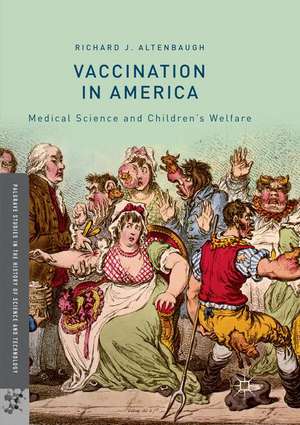Vaccination in America: Medical Science and Children’s Welfare: Palgrave Studies in the History of Science and Technology
Autor Richard J. Altenbaughen Limba Engleză Paperback – 25 ian 2019
| Toate formatele și edițiile | Preț | Express |
|---|---|---|
| Paperback (1) | 781.77 lei 43-57 zile | |
| Springer International Publishing – 25 ian 2019 | 781.77 lei 43-57 zile | |
| Hardback (1) | 786.98 lei 43-57 zile | |
| Springer International Publishing – 16 aug 2018 | 786.98 lei 43-57 zile |
Din seria Palgrave Studies in the History of Science and Technology
-
 Preț: 352.16 lei
Preț: 352.16 lei -
 Preț: 223.88 lei
Preț: 223.88 lei -
 Preț: 491.21 lei
Preț: 491.21 lei - 18%
 Preț: 783.81 lei
Preț: 783.81 lei - 15%
 Preț: 645.93 lei
Preț: 645.93 lei - 18%
 Preț: 734.09 lei
Preț: 734.09 lei - 15%
 Preț: 698.94 lei
Preț: 698.94 lei - 15%
 Preț: 640.37 lei
Preț: 640.37 lei - 15%
 Preț: 695.01 lei
Preț: 695.01 lei -
 Preț: 385.25 lei
Preț: 385.25 lei -
 Preț: 323.28 lei
Preț: 323.28 lei -
 Preț: 332.33 lei
Preț: 332.33 lei -
 Preț: 389.11 lei
Preț: 389.11 lei - 18%
 Preț: 786.98 lei
Preț: 786.98 lei -
 Preț: 383.93 lei
Preț: 383.93 lei - 18%
 Preț: 772.30 lei
Preț: 772.30 lei - 18%
 Preț: 948.16 lei
Preț: 948.16 lei - 18%
 Preț: 795.83 lei
Preț: 795.83 lei - 18%
 Preț: 732.52 lei
Preț: 732.52 lei -
 Preț: 383.93 lei
Preț: 383.93 lei -
 Preț: 418.07 lei
Preț: 418.07 lei - 18%
 Preț: 731.91 lei
Preț: 731.91 lei - 18%
 Preț: 727.18 lei
Preț: 727.18 lei -
 Preț: 391.02 lei
Preț: 391.02 lei - 18%
 Preț: 729.68 lei
Preț: 729.68 lei -
 Preț: 398.35 lei
Preț: 398.35 lei - 15%
 Preț: 645.79 lei
Preț: 645.79 lei -
 Preț: 420.97 lei
Preț: 420.97 lei - 15%
 Preț: 582.80 lei
Preț: 582.80 lei -
 Preț: 213.58 lei
Preț: 213.58 lei - 18%
 Preț: 785.11 lei
Preț: 785.11 lei -
 Preț: 385.84 lei
Preț: 385.84 lei -
 Preț: 388.52 lei
Preț: 388.52 lei -
 Preț: 417.68 lei
Preț: 417.68 lei -
 Preț: 385.84 lei
Preț: 385.84 lei
Preț: 781.77 lei
Preț vechi: 953.37 lei
-18% Nou
Puncte Express: 1173
Preț estimativ în valută:
149.59€ • 156.60$ • 123.78£
149.59€ • 156.60$ • 123.78£
Carte tipărită la comandă
Livrare economică 07-21 aprilie
Preluare comenzi: 021 569.72.76
Specificații
ISBN-13: 9783030071790
ISBN-10: 3030071790
Pagini: 355
Ilustrații: VIII, 355 p.
Dimensiuni: 148 x 210 mm
Greutate: 0.44 kg
Ediția:Softcover reprint of the original 1st ed. 2018
Editura: Springer International Publishing
Colecția Palgrave Macmillan
Seria Palgrave Studies in the History of Science and Technology
Locul publicării:Cham, Switzerland
ISBN-10: 3030071790
Pagini: 355
Ilustrații: VIII, 355 p.
Dimensiuni: 148 x 210 mm
Greutate: 0.44 kg
Ediția:Softcover reprint of the original 1st ed. 2018
Editura: Springer International Publishing
Colecția Palgrave Macmillan
Seria Palgrave Studies in the History of Science and Technology
Locul publicării:Cham, Switzerland
Cuprins
1. Introduction: To Vaccinate, or Not to Vaccinate.- I. Diseases, Death, and Disability.- 2. Living on the Edge.- 3. Bad Odors, Nasty Dust, and Dangerous Bugs.- 4. Not My Child!.- II. Friendly Persuasion.- 5. Invisible Bugs Are Bad for You.- 6. Schoolhouse Medicine.- 7. Capstone Events.- III. Ethical Authority?.- 8. Mistake and Misdeeds.- 9. Blood.- 10. A Moral Compass?.- 11. A Problematic Process.- 12. School Days.- IV. Line Up and Roll Up Your Sleeves.- 13. Operation Needle.- 14. The Complexities of Mass Immunization Culture.- V. Intellectual Authority?.- 15. A Little Knowledge Is a Dangerous Thing.- 16. What Is Science?
Recenzii
“This could be a book for parents whose children would be vaccinated. … More widely, it is a book for practitioners who have to cope with parental refusal of vaccination, historians of social medicine and, possibly, students of the history of medicine thanks to its interdisciplinary approach combining bioethics, education, research, and public health policies.” (Alain Touwaide, Doody's Book Reviews, May 31, 2019)
Notă biografică
Richard J. Altenbaugh is Adjunct Professor at the University of Pittsburgh, USA, and former Visiting Fellow at St. Edmund's College, University of Cambridge, UK. His most recent book is The Last Children’s Plague: Poliomyelitis, Disability, and Twentieth-Century American Culture.
Textul de pe ultima copertă
The success of the polio vaccine was a remarkable breakthrough for medical science, effectively eradicating a dreaded childhood disease. It was also the largest medical experiment to use American schoolchildren. Richard J. Altenbaugh examines an uneasy conundrum in the history of vaccination: even as vaccines greatly mitigate the harm that infectious disease causes children, the process of developing these vaccines put children at great risk as research subjects. In the first half of the twentieth century, in the face of widespread resistance to vaccines, public health officials gradually medicalized American culture through mass media, public health campaigns, and the public education system. Schools supplied tens of thousands of young human subjects to researchers, school buildings became the main dispensaries of the polio antigen, and the mass immunization campaign that followed changed American public health policy in profound ways. Tapping links between bioethics, education, public health, and medical research, this book raises fundamental questions about child welfare and the tension between private and public responsibility that still fuel anxieties around vaccination today.
Caracteristici
Offers an engaging study of the Salk polio vaccine trials, the largest in history, placing them in the context of earlier vaccine trials in the first half of the twentieth century Foregrounds the understudied role of the public education system in the history of vaccination Examines the contemporary antivaccination movement in the United States and its roots, tracing the development of parents’ perceptions about the risks that vaccinations posed for their children
